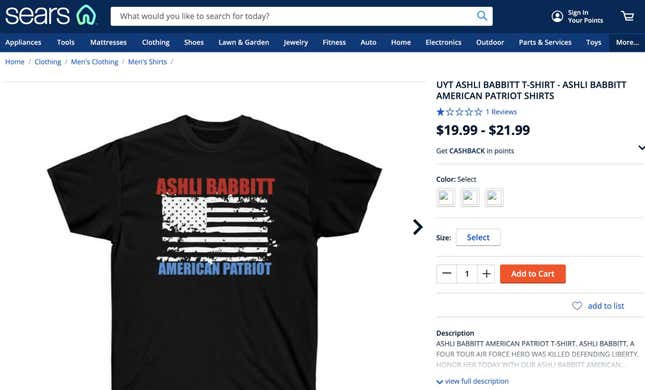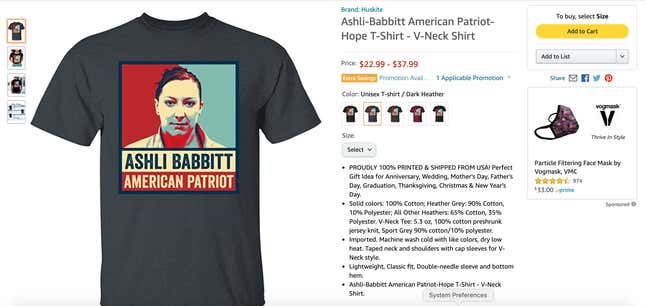
In the six months since the insurrection that took place at the U.S. Capitol on January 6, 2021, there have been countless lies told by the right wing about the events and intent of that day, but perhaps the biggest is that the shooting of Ashli Babbitt as she attempted to breach the Speaker’s Lobby through a smashed window somehow rendered the military veteran turned QAnon conspiracist a martyr.
To be sure, Babbitt’s death was senseless—senseless because it was in service to the irrational, inane, yet persistent lie that Donald Trump is somehow the duly elected president of the United States. (Spoiler alert: He’s not.) However, that hasn’t stopped fellow conspiracists from praising Babbitt as a “patriot”—and now, American retailers seeking to profit from the third-party retailer market are getting caught in the crosshairs.
As the nation and media reflected on the insurrection and ongoing investigation on Tuesday, Aaron Rupar, associate editor of politics & policy at Vox made another discovery at two of the country’s most recognizable retail brands. Sears and Kmart, both American big box pioneers now under the same ownership, were each selling “Ashli Babbitt ‘American Patriot’” t-shirts in their online marketplaces.
“Ashli Babbitt, a four tour Air Force hero was killed defending liberty,” the item’s description read, adding: “Honor her today with our Ashli Babbitt American [Patriot t-shirt].”
To be clear, the items were created and posted by a third-party seller, and similar items are available throughout the internet. However, as more and more retailers have been called to account for their political affiliations in the wake of the Capitol riots, the behavior of the third-party sellers they host on their platforms has become an increased liability. As of 2016, Sears Holdings had donated to both parties, but called out by Rupar on Twitter on Tuesday, the company quickly responded, claiming to have removed the Babbitt-branded merchandise from both its website and Kmart’s. (A Wednesday morning search of both platforms seemed to confirm this.)
Nevertheless, as the culture war continues to escalate, third-party sellers will likely prove a consistent problem which require increasingly extensive (and expensive) monitoring, as proven last week when Walmart was sued by Kanye West for selling third-party knockoffs of his Yeezy Foam Runners. However, these marketplaces—which host millions of items—have already proven a profitable enough model for most retailers to consider them well worth the trouble.
Case in point? Almost a full day after Rupar’s callout caused Sears and Kmart to trend for hours on Twitter, as of Wednesday morning when I began this post, the world’s biggest retailer, Amazon, still had Babbitt merch for sale from a third-party seller named Huskite. This time, the “Ashli Babbitt ‘American Patriot’” t-shirt ironically featured art in the style of Shepard Fairey’s iconic Obama “Hope” poster. Perhaps the world’s biggest marketplace was taking its chances, but it’s clearly since gotten the memo; the t-shirt has been pulled from the site within the past hour.


